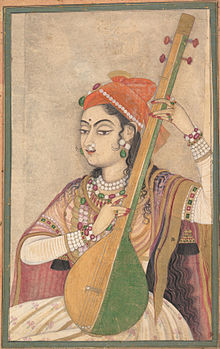Saang
| Music of India | |
|---|---|

A Lady Playing the Tanpura, ca. 1735 (Rajasthan)
|
|
| Genres | |
|
|
| Media and performance | |
| Music awards | |
| Music festivals | |
| Music media | |
| Nationalistic and patriotic songs | |
| National anthem | Jana Gana Mana |
| Regional music | |
|
|
Saang (Hindi: सांग), also known as Swang or Svang (स्वांग), is a popular folk dance–theatre form in Rajasthan, Haryana, Uttar Pradesh and Malwa region of Madhya Pradesh. Swang incorporates suitable theatrics and mimicry (or nakal) accompanied by song and dialogue. It is dialogue-oriented rather than movement-oriented. Religious stories and folk tales are enacted by a group of ten or twelve persons in an open area or an open-air theatre surrounded by the audience.Swang as an art of imitation means Rang-Bharna, Nakal-Karna.
Swang can be considered as the most ancient folk theatre form of India. Nautanki, Saang, Tamasha originated from the Swang traditions.Old Swang traditions are:
-means one male and one female performers start the story.
- means one saangi player and one dholak player joins the performance. This Swang/Saang performance was active at the time of Sant Kabir and Guru Nanak.
Tradition credits Kishan Lal Bhaat for laying the foundation of the present style of Swang about two hundred years ago. During Mughal period and specifically at the time of Aurangzeb women were strictly banned from public performances. Since women did not participate in the dance-drama form, men have traditionally enacted their roles.Later on different performers changed the style according to the socio-political situations.
Stage is similar to operatic performance.The stage may consist of a clear circular open area, or at the most, a wooden platform about three and a half metre in length. There are no elaborate stage arrangements similar to modern dramatic performances. There are no backdrops, curtains or green-rooms. Typically, there are no microphones or loudspeakers either. An hour or so before the show, the musicians of the orchestra begin to sing religious or other songs connected with the play in order to create the proper atmosphere for the play. The 'Guru' then appears and the artistes touch his feet to evoke his blessings. The play opens with a song ('bhait' or offering) in praise of Bhawani, the Goddess of Knowledge:
...
Wikipedia
